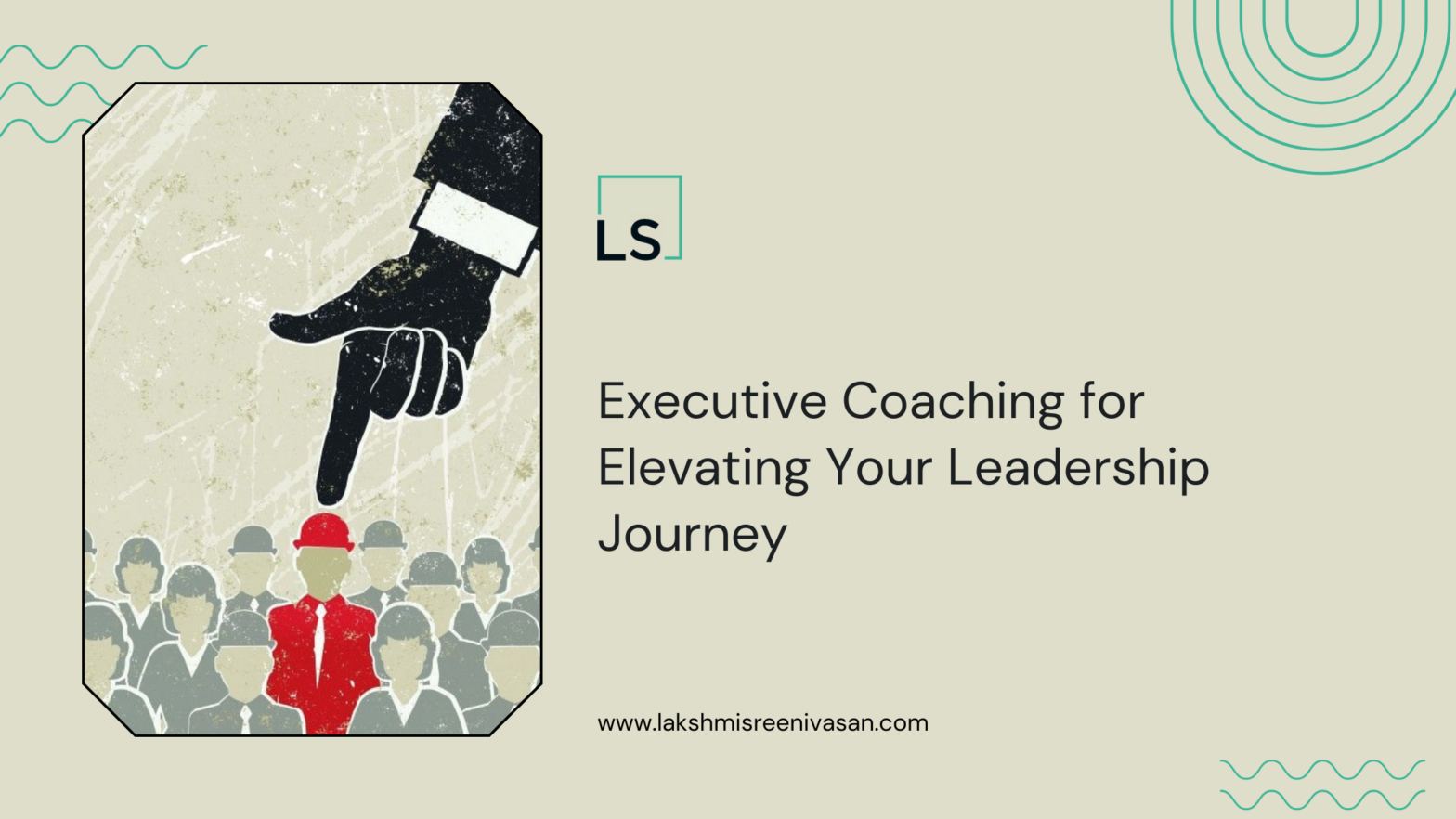
Like many others, you may think executive coaching is only for those struggling with career crises or performance issues. But the truth is, executive coaching is incredibly valuable for those who aim to take their careers to the next level.
Imagine this, You’re already doing well in your career, achieving impressive results, and earning recognition. Yet, you know there’s untapped potential, you wish to explore newer and bigger challenges or maybe diversify and try something new in your domain. You have big dreams and ambitions, but something seems to hold you back.
Sound familiar?
That’s where executive coaching comes in. Think of it as having a personal coach for your professional life—somebody who helps you reach new peaks, overcome barriers, and achieve your goals.
Introduction: Understanding the Power of Executive Coaching
The business landscapes are swift and evolving where effective leadership is crucial. Executive coaching has become a vital resource for developing leaders, refining their skills, and steering them toward excellence. But what exactly is executive coaching, and how does it differ from other forms of development?
Executive Coaching Defined:
Executive coaching is a personalised, confidential development partnership between a highly qualified coach and a leader within an organisation. Through structured discussions and activities, the coach helps the leader achieve self-awareness, identify areas for progress, and develop strategies to their full possibility.
Core Principles of Executive Coaching:
- Confidentiality: Executive coaching sessions are a safe space for leaders to explore challenges and vulnerabilities without fear of judgment. This open and trusting environment fosters honest reflection and growth.
- Action-Oriented: Executive coaching goes beyond simply talking about problems. Coaches work with leaders to develop concrete action plans that can be implemented immediately. This ensures that coaching translates into tangible results.
- Client-Centered: The emphasis of executive coaching is on the leader’s goals and aspirations. The coach serves as a guide and facilitator, enabling the leader to discover solutions and cultivate their distinct leadership style.
- Results-Oriented: Effective executive coaching programs are designed to deliver measurable outcomes. This could include improved leadership effectiveness, enhanced team performance, or increased strategic thinking.
Executive Coaching vs. Other Forms of Development:
While executive coaching shares some similarities with other forms of professional development, it has some key distinctions:
- Mentoring: Mentors are often senior leaders who provide guidance and advice based on their experiences. While mentoring can be beneficial, it may not be as focused on developing the leader’s self-awareness and self-coaching skills.
- Training: Training programs typically focus on imparting specific skills or knowledge. Executive coaching, on the other hand, takes a more holistic approach, addressing both the leader’s skills and mindset.
- Therapy: Therapists focus on helping individuals overcome personal challenges and emotional blocks. While executive coaching may address personal issues impacting leadership performance, its primary focus is professional development.
Executive coaching offers a unique approach to leadership development by providing a safe space for reflection, fostering self-discovery, and empowering leaders to take action. By partnering with an experienced coach, leaders can unlock their full potential and propel their organizations toward success.
The Powerful Benefits of Executive Coaching
Leaders are constantly bombarded with challenges, from navigating complex strategic decisions to motivating diverse teams and fostering innovation. Executive coaching has become an essential resource for leaders to navigate complexities and achieve higher levels of performance. But what exactly are the benefits of executive coaching?
- Enhanced Self-Awareness:
One of the most important advantages of executive coaching is the development of self-awareness. Through structured conversations and assessments, leaders gain a deeper understanding of their strengths, weaknesses, leadership styles, and potential blind spots. This self-awareness is critical for making informed decisions, managing emotions effectively, and building stronger relationships with colleagues.
- Improved Decision-Making:
With heightened self-awareness comes the ability to make more confident and strategic decisions. Coaches guide leaders through a structured framework for analyzing complex problems, considering diverse perspectives, and weighing potential risks and rewards. This results in better-trained leaders to make sound decisions that drive organizational success.
- Increased Emotional Intelligence:
Emotional intelligence (EQ) is an important skill for successful leadership. Executive coaches help leaders develop their EQ by working on areas like self-regulation, empathy, and relationship management. By improving their EQ, leaders can foster a more positive and productive work environment, build trust with team members, and navigate challenging interpersonal situations with greater skill.
- Enhanced Communication Skills:
Effective communication is fundamental to successful leadership. Through role-playing activities and personalised feedback, executive coaching empowers leaders to hone their communication skills. This includes learning to communicate clearly and concisely, actively listen to others, and deliver constructive feedback. Improved communication fosters stronger relationships, increases team engagement, and ensures everyone is aligned toward achieving goals.
- Boosted Confidence and Resilience:
Leading an organization can be demanding and stressful. Executive coaching provides a supportive space for leaders to explore challenges and develop strategies for managing stress and building resilience. Through coaching, leaders can devise a growth mindset, learn to bounce back from setbacks, and face challenges with confidence.
- Sharpened Strategic Thinking:
The business world is constantly evolving, and leaders need to be able to think strategically to keep pace. Executive coaching helps leaders develop their strategic thinking skills by fostering big-picture thinking, analyzing market trends, and identifying new growth opportunities. This allows leaders to make informed strategic decisions that position their organizations for long-term success.
- Achieving Peak Performance:
Executive coaching isn’t just about addressing weaknesses; it’s about unlocking a leader’s full potential. Through personalized coaching, leaders can refine their existing skills, learn new approaches, and develop effective leadership styles that inspire and motivate teams. This ultimately translates to improved performance at both the individual and organizational levels.
Investing in executive coaching means investing in leadership excellence. The benefits are far-reaching, leading to increased self-awareness, stronger decision-making, and a more positive and productive work environment. At LS Learning Management Systems, our coaching programs are created to provide these advantages and more, tailored to the typical needs of each leader.
The Executive Coaching Process
The executive coaching process begins with an initial assessment and goal setting. This involves understanding the leader’s current situation, identifying their goals, and developing a personalized coaching plan. The coach provides regular feedback and progress evaluation, ensuring leaders stay on track and achieve their objectives. At LS Learning Management Systems, we believe in a holistic approach to coaching, integrating various techniques and methodologies to create a comprehensive development plan.
Key Areas of Focus in Executive Coaching
Our executive coaching programs address various areas that align with the core benefits we’ve discussed. These key areas include:
- Self-Awareness: Developing a deeper understanding of strengths, weaknesses, leadership style, and potential blind spots.
- Strategic Thinking: Enhancing big-picture thinking, analyzing market trends, and identifying new opportunities.
- Decision-Making Skills: Building a framework for analyzing problems, considering diverse perspectives, and making sound choices.
- Emotional Intelligence: Improving self-regulation, empathy, and relationship management for a more positive work environment.
- Communication Skills: Honing the ability to communicate, listen actively, and deliver constructive feedback.
- Resilience and Confidence: Developing a growth mindset, managing stress, and approaching challenges positively.
Beyond these core areas, our programs encompass additional aspects of leadership development. This includes conflict resolution, effective communication (which we emphasize heavily), building high-performance teams, and enhancing strategic thinking. These broader areas are crucial for leaders who want to drive their organizations forward and achieve sustainable success.
Lakshmi Sreenivasan, with her expertise in adult learning and experiential workshops, ensures that our coaching programs are engaging, practical, and results-oriented. This ensures that leaders gain the most from their coaching experience and can translate their newfound skills into tangible improvements for themselves and their organizations.
Choosing the Right Executive Coach
Choosing the right executive coach is important for your leadership development journey. The ideal coach should not only have the necessary expertise and experience but also align with your professional goals and organizational values. Here are some key considerations:
- Expertise and Credentials: Look for coaches with a strong background in leadership development, relevant certifications, and a proven track record of success.
- Approach and Methodology: Ensure the coach’s approach resonates with you. Effective executive coaching should encompass transformational learning, behavior theory, active learning, and guided practice.
- Customized Programs: Choose a coach who offers tailored programs that address your needs and goals. At LS Learning Management Systems, our programs help executives develop and master essential skills and behaviors to navigate complex work environments. We guide individuals from building awareness to taking actionable steps that facilitate desired outcomes.
- Areas of Focus: A well-rounded coaching program should cover key areas such as self-awareness, leadership excellence, behavioral skills, managerial excellence, the science of living, and work-life balance.
At LS Learning Management Systems, our executive coaching programs are designed to foster leadership growth and excellence. Led by the esteemed Lakshmi Sreenivasan, our coaching engagements are personalized and anchored in transformational learning, ensuring develop the skills needed to thrive in today’s dynamic work environment.
Future Trends in Executive Coaching
The landscape of executive coaching is continually evolving, driven by technology advancements and innovative methodologies. These changes are shaping the future of coaching, making it more accessible, effective, and tailored to individual needs.
The Role of Technology and Virtual Coaching
Technology has revolutionized executive coaching, making it more flexible and scalable. Virtual coaching allows for real-time, interactive sessions regardless of geographical constraints, enabling leaders to access top-tier coaching talent anywhere in the world. Additionally, AI-driven tools and apps provide personalized feedback, track progress, and offer resources for continuous learning. These technological advancements democratise coaching, allowing more leaders to benefit from these services.
Emerging Trends and Innovations in Coaching Methodologies
New and emerging trends in coaching methodologies are also shaping the future of executive coaching. These include:
- Holistic Coaching Approaches: Integrating mental wellness, mindfulness, and emotional intelligence to support leaders more comprehensively.
- Data-Driven Coaching: Utilizing data analytics to track progress, measure outcomes, and tailor coaching strategies to the specific needs of the leader.
- Blended Learning Models: Combining traditional face-to-face coaching with digital tools and resources to create a hybrid model that enhances learning and development.
- Customisation and Personalisation: Increasing emphasis on highly customized coaching plans for each leader that address the unique strengths, weaknesses, and goals.
By adopting these trends, executive coaching is poised to become even more impactful, helping leaders navigate the intricacies of modern business environments and acquire their full potential.
Conclusion: Performance Improvement and Growth—The Ultimate Impact of Executive Coaching
Executive coaching goes beyond being a professional development tool; it is a strategic investment in the future of your organisation. By fostering leadership growth and performance improvement, executive coaching empowers leaders to navigate complex challenges, capitalise on opportunities, and drive their teams to unprecedented heights. The ultimate impact is a more agile, resilient, and innovative organisation poised for sustained success.
At LS Learning Management Systems, we specialise in delivering high-quality executive coaching that creates a lasting impact. Our tailored coaching programs are designed to elevate your leadership journey and foster a culture of excellence within your organization.
Ready to elevate your leadership journey? Contact our team at team@lakshmisreenivasan.com for expert executive coaching and corporate training.

